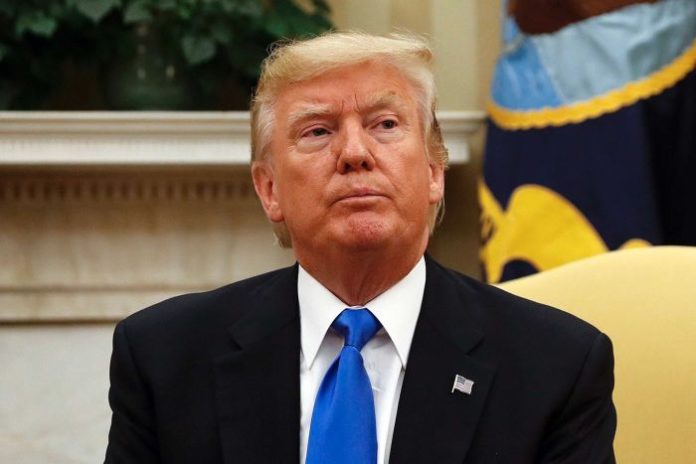U.S. President Donald Trump was impeached by the House of Representatives Wednesday night, accused of abusing the power of the presidency to benefit himself politically and then obstructing congressional efforts to investigate his actions.
On a near straight party-line vote, the Democrat-controlled House approved two articles of impeachment against Trump, a Republican, making him only the third U.S. president to be impeached in the country’s 243-year history.
Trump, who has scoffed at the impeachment allegations and assailed Democrats for pursuing it, now will likely face a trial in January in the Senate. But the Republican majority in the chamber is highly likely to acquit him, leaving voters to decide Trump’s fate as he seeks a second term in the White House in next November’s national election.
The White House released a statement shortly after the vote, which said, “Today marks the culmination in the House of one of the most shameful political episodes in the history of our Nation.” It called the the actions a “sham impeachment.”
The statement added, “The President is confident the Senate will restore regular order, fairness, and due process, all of which were ignored in the House proceedings. He is prepared for the next steps and confident that he will be fully exonerated.”
The House debated the merits of Trump’s impeachment for more than six hours before voting. Democratic lawmakers pointedly advanced the case for Trump’s impeachment. They alternated with Republicans, who said Trump had done nothing wrong in his monthslong push to get Ukraine to investigate one of Trump’s chief 2020 Democratic challengers, former Vice President Joe Biden, his son Hunter Biden’s lucrative work for a Ukrainian natural gas company and a debunked theory that Ukraine meddled in the 2016 election that Trump won to undermine his campaign.
Trump made the appeal for the Biden investigations directly to Ukrainian President Volodymyr Zelenskiy in a late July phone call at a time when he was temporarily withholding $391 million in military aid Kyiv wanted to help fight pro-Russian separatists in eastern Ukraine.
Trump eventually released the money in September without Zelenskiy launching the Biden investigations, proof, Republicans said during the House floor debate, that Trump had not engaged in a reciprocal quid pro quo deal, the military aid in exchange for the Biden investigations.
One of the articles of impeachment approved by the House accused Trump of abusing the power of the presidency by soliciting a foreign government, Ukraine, to undertake the investigations to help him run against Biden, who is leading national polls of Democrats in the race for the party’s presidential nomination to oppose Trump next year.
In the 230-197 vote on Article I, all but two Democrats voted for approval, and all Republicans voted against it.
The second impeachment allegation said Trump obstructed Congress by withholding thousands of Ukraine-related documents from House impeachment investigators and then blocking key officials in his administration from testifying during weeks of hearings Democratic-controlled committees conducted into Trump’s actions related to Ukraine.
In the 229-198 vote on Article 11, all but three Democrats voted for approval, and all Republicans voted against it.
The House meets again Thursday morning.
Earlier Wednesday, House Speaker Nancy Pelosi opened the debate, telling lawmakers that Trump “gave us no choice” but to pursue his impeachment.
“If we do not act,” she said, “we would be derelict in our duty. Today, we are here to defend democracy.”
Republican Congressman Doug Collins, one of Trump’s staunchest supporters, dismissed Pelosi’s assessment of Trump, contending Democrats have wanted to impeach Trump since he was elected three years ago. Now, Collins said, rather than the House impeaching Trump less than a year before he seeks re-election in 2020, it should be “a matter for the voters” to decide his fate.”The president did nothing wrong,” Collins said.
The two other U.S. presidents who have been impeached were Andrew Johnson in the mid-19th century and Bill Clinton two decades ago. Both were acquitted in the Senate and remained in office.
The impeachment votes were held about the same time Trump began to speak at a campaign rally in the Midwestern state of Michigan, one of the pivotal states he won in the 2016 election that made him the 45th U.S. president.
Trump blasted the Democratic-led effort to impeach him, telling supporters Wednesday night, “We did nothing wrong, and we have tremendous support in the Republican Party like we’ve never had before.”
“This lawless, partisan impeachment is a political suicide march for the Democrat Party. Have you seen my polls in the last four weeks?” he said.
Trump has on countless occasions described his late July call with Zelenskiy as “perfect,” when he asked him to “do us a favor,” to investigate the Bidens and Ukraine’s purported role in the 2016 election. As the impeachment controversy mounted,Trump has subsequently claimed the “us” in his request to Zelenskiy referred not to him personally but to the United States.
In his ranting letter to Pelosi on Tuesday, Trump accused Democrats of engaging in a “perversion of justice” and an “attempted coup,” claiming his opponents had declared “open war on American Democracy.”
Among other vitriolic adjectives, Trump called the impeachment process “invalid,” “spiteful,” “meritless,” “disingenuous,” “baseless,” and “preposterous.”
Pelosi called the letter “really sick.”
She wrote to House members, saying that in considering whether to impeach a president, they would be exercising “one of the most solemn powers granted to us by the Constitution.”
Pelosi, for months reluctant to pursue Trump’s impeachment, concluded, “Very sadly, the facts have made clear that the President abused his power for his own personal, political benefit and that he obstructed Congress as he demanded that he is above accountability, above the Constitution and above the American people. In America, no one is above the law.”



















